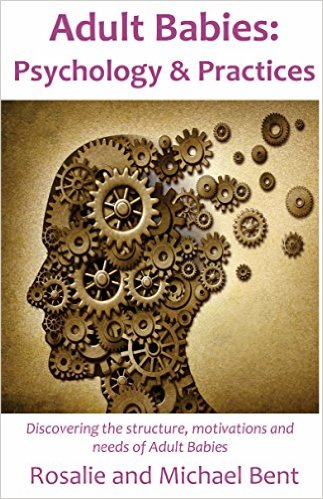Book by Rosalie and Michael Bent, review by BitterGrey

I was initially optimistic when I learned that Rosalie and Michael Bent had come out with a new book. Rosalie Bent's prior book, "There's a Baby in My Bed", had met with a mixed response. Some welcomed it as a book about AB/DLs written by a non-AB/DL, while others objected to its narrow categorizations. It had potential, but some genuine limitations as well. The Bents have also been running their own AB/DL surveys, and there are precious few empirical studies on AB/DLs. Sadly, "Adult Babies: Psychology and Practices: Discovering the structure, motivations and needs of Adult Babies" neither addressed these limitations nor developed an empirical foundation.
In the first book, Rosalie Bent imposed some specific categories of AB/DL and specific uses of common terms. This wasn't unreasonable in itself, but the imposition wasn't properly managed. The new book expresses an awareness of this risk, but doesn't adequately avoid it.
Populations will often object to scientists who seem to be proscriptive (telling us who we are) when they should be descriptive (observing who we are). In sciences with a well-established foundation of empirical support, being prescriptive is sometimes reasonable. "Adult Babies: Psychology and Practices" doesn't have such a foundation. Some statistics are offered, but some seem unclear or contradictory. For example, the percentage of parents who accuse their children of being pedophiles after discovering them wearing diapers is given as 8% early in the book and 10% later in the book. Perhaps there is a difference in the sample or some other subtle difference in the statistics which might make them both accurate. However, that such details aren't explained is a failing of the book. In turn, the lack of a strong and clear empirical foundation undermines the categorizations, making them seem narrow and arbitrary instead of insightful.
The book did forward some interesting assertions. However, they weren't developed into widely supported theories or even into testable hypotheses. Primarily, infantilism was explained as a Freudian regression or fixation. A traumatized Vietnam War Veteran, who didn't mature past his soldier-hood yet wasn't aware of his immaturity, was given as an example. However, many AB/DLs came from supportive homes, are reasonably successful and mature, and are aware of their need to do immature things sometimes. The case made for the theory seems unconvincing. The book also offers the "baby-diaper equivalence theorem", which basically states that diapers and babyhood are strongly associated. This is a reasonable observation (in Western culture) but isn't developed further.
While not living up to my expectations, the book still has something to offer. Groups of "Attachment objects"DEF are elaborated and the role of incontinence as a source of authenticity was explored. It was pleasing to see an appendix on being a Christian AB/DL. While some might find Rosalie and Michael Bent's "Adult Babies: Psychology and Practices" helpful, it isn't a book for everyone.
Do you have Questions, tips, suggestions, or other feedback?